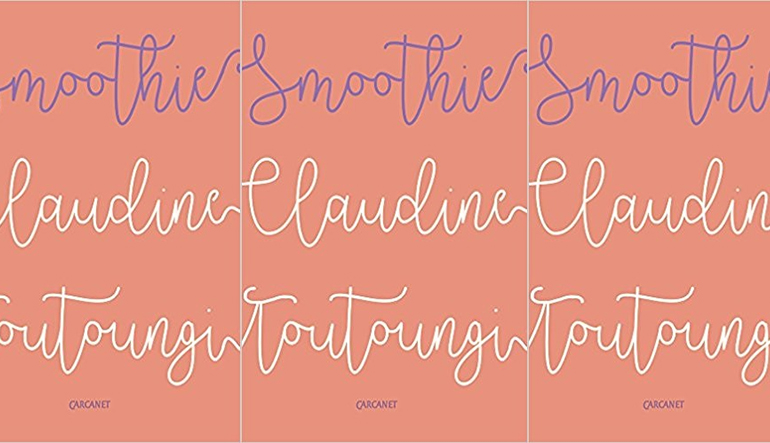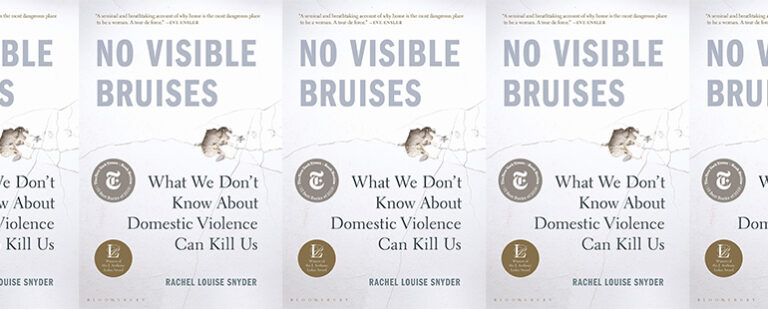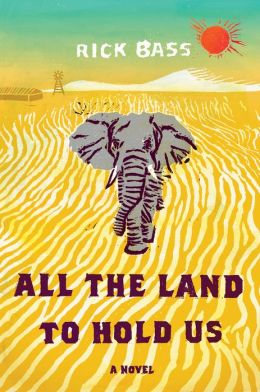Review: SMOOTHIE by Claudine Toutoungi
 Smoothie
Smoothie
Claudine Toutoungi
Carcanet Press Ltd, Dec. 1 2017
80 pp; $12.99
Reviewed by Peter Pegnall
It is rare that a first collection of poems bounces into the mind like a gifted child, difficult, effervescent, wildly inventive and not to be silenced. When it happens, woe betide the over cautious critic who fails to register both excitement and eager anticipation of more to come. Simon Armitage’s first book (Zoom) burst in on me like that, as did Selima Hill’s (Saying Hello at the Station). Now, I am delighted to say, I have been ambushed by excellence again.
Claudine Toutoungi’s debut volume, Smoothie, is as different from that particular fruit and vegetable packed beverage as I can imagine: if it’s a drink, it is Jack Daniels, or Campari, or even Fernet Branca, that almost emetic hangover cure. The color of these poems is closer to amber than strawberry pink or carrot orange. There is danger and exhilaration here and a kind of excoriating honesty: from the very beginning she is unafraid to appear unreasonable, even absurd in her emotional skirmishes. Take this image in a great faux love poem, “This is Not a Fad”:
Because I think you’d like me better as an artefact
I sit for ages in the sculpture park.
Flies settle on my arms.
As if this weren’t excruciating enough, she descends to this:
this is for real. I shall remain here,
unmoved by sheep and hedge trimmers
until you notice me.
It is apparent that love is not an easy ride, but also that the poet persona is hard enough to handle, knows her own mind, even when it hurts. We can overdo the “lightness of touch” acclamations, yet it’s here, in tough delicacy, very little escapes rueful attention. Take a grueling New Year’s visit by a close friend or lover, expressed in a breathless list of grim incidents in “New Year’s Wrestling”:
leaving aside Aunt Marjorie,
her naked denial of sex and
insistence at all times on close proximity
to teapots…
Despite all this, and much more, the invitation is touchingly repeated:
Come again. Come often.
A good heart as well as an astringent mind is evident throughout this exhilarating, challenging volume. The meaningful content is by no means restricted to the vicissitudes of romance or family: there are assaults on a machine age, on fundamentalism, on professional jealousy. Paeans to the underdog and to the poet hounded by the smart ass critic.
Toutoungi is an actor and a dramatist as well as a poet and this lends force to some of the personae she inhabits. Take, for example, the unruly creature that is “My Monster,” a mischievous maverick who
scoffs caterpillars off nasturtiums,
likes me to tickle his underside
In case monster’s human side escapes us, he
…burps and farts and
blows his nose on oily rags
He is not about to conform, not to any transient authority:
His habits will not be reeled in for queens
birthdays or ambassadorial visits.’
Imagine Kafka’s dung beetle being proud of his insect nature and outcast status and you have the Claudine transformation at your fingertips. It is even compassionate in its oddness, weeping for a duck “stranded on tarmac” Serious fun.
More purely serious is “Whitehaven,” in which the poet carves a vivid impression of the bleak, Northern town to which her father must have emigrated:
It is only grey here, great slates of it
And the roll and smash of sea into stone
It baffles her, this choice of a homeland without orange blossom, boulevard lovers, flaneurs. However, she, too, takes her place next to her father, under a sky drained of light:
Spray soaks my face. I breathe it in,
leaning towards my father’s country.
There is a very substantial sense of humanity throughout the poems, a mixture of self-disparagement and daring. In fact, I’d question the publicist’s rejection of the word “confessional.” Confessional can be wonderful, if it is not whining, it can embrace, rather than exclude the reader. This poet is too significant to be contained by caveats.
I cannot resist concluding this brief survey with a lyric of exquisite tenderness, from the poem “Apostrophe”—you won’t forget this in a hurry. What more can we ask of a poem?
Tonight the white moon is as slim as a fingernail.
Slick as grammar, this slender curl,
The night sky’s Apostrophe of Possession…How would it be if I could hook you with such certitude,
My arm curving around your shoulders?
Peter Pegnall has published six collections of poetry, the most recent being Bright Scarf: Love and Fear; he writes obituaries and blogs for The Daily Telegraph and The Guardian, theatre reviews for The Catholic Herald and The London Magazine and book reviews for Poetry Ireland Review, The London Magazine and Fortnight.


